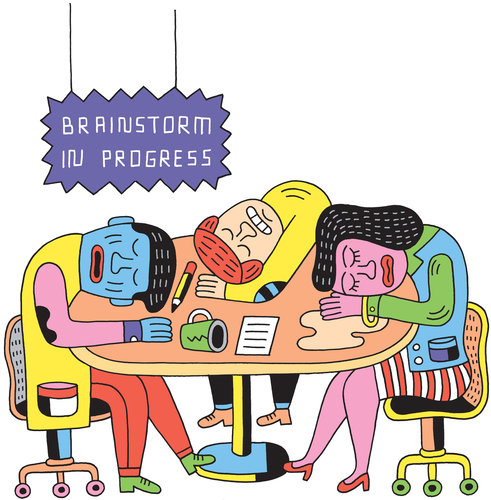Debate: How to Brainstorm Effectively

Andy Rementer — The New York Times | January 15, 2012
- Innovation Is About Arguing, Not Brainstorming. Here’s How To Argue Productively. – written by Daniel Sobol from Continuum, posted on Co.Design
“Deliberative discourse is not just arguing for argument’s sake. Argument is productive for us because everyone knows that we’re working toward a shared goal. The statement of purpose establishes the rules: It reminds us that we are working together to move the ball down the field. As much as we may argue and disagree, anything that happens in the room counts toward our shared goal. This enables us to argue and discuss without hurting one another.”
This is important because I’ve definitely been in brainstorming sessions where some people took things way off topic and at the end of the day we made little progress.
- The Brainstorming Process Is B.S. But Can We Rework It? – written by Cliff Kuang, founding editor of Co.Design
“For one, the brainstorming might work better if it focused not on finding solutions, but rather identifying problems. What if, during a brainstorming session, people weren’t asked to simply throw out ideas, but rather problems as well? Granted, you’ve still got the annoying problem of groupthink. But the fact is that people are usually better at finding fault than they are at finding answers. Properly harnessed, that could be a good thing.”
This is true, but once the problems are identified we still need solutions. Maybe that is where individual thinking can come into play before regrouping to discuss ideas.
- Groupthink: The brainstorming myth – written by Jonah Lehrer, posted on The New Yorker
“The underlying assumption of brainstorming is that if people are scared of saying the wrong thing, they’ll end up saying nothing at all. The appeal of this idea is obvious: it’s always nice to be saturated in positive feedback. Typically, participants leave a brainstorming session proud of their contribution. The whiteboard has been filled with free associations. Brainstorming seems like an ideal technique, a feel-good way to boost productivity. But there is a problem with brainstorming. It doesn’t work.”
- The Rise of the New Groupthink – written by Susan Cain, posted on The New Times
“Solitude has long been associated with creativity and transcendence. Culturally, we’re often so dazzled by charisma that we overlook the quiet part of the creative process.”
“I’m not suggesting that we abolish teamwork. Indeed, recent studies suggest that influential academic work is increasingly conducted by teams rather than by individuals. (Although teams whose members collaborate remotely, from separate universities, appear to be the most influential of all.) The problems we face in science, economics and many other fields are more complex than ever before, and we’ll need to stand on one another’s shoulders if we can possibly hope to solve them. But even if the problems are different, human nature remains the same. And most humans have two contradictory impulses: we love and need one another, yet we crave privacy and autonomy. To harness the energy that fuels both these drives, we need to move beyond the New Groupthink and embrace a more nuanced approach to creativity and learning. Our offices should encourage casual, cafe-style interactions, but allow people to disappear into personalized, private spaces when they want to be alone. Our schools should teach children to work with others, but also to work on their own for sustained periods of time. And we must recognize that introverts need extra quiet and privacy to do their best work.”
So, what do you think effective brainstorming looks like?

Andy Rementer — The New York Times | January 15, 2012

Related posts: